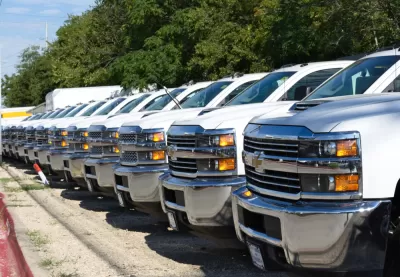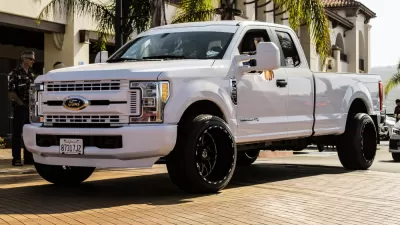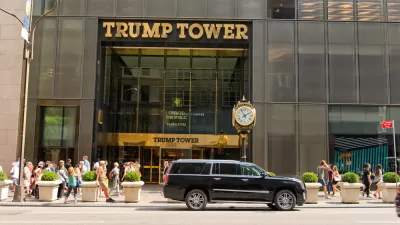D.C. is considering a $500 vehicle license fee for private vehicles over 6,000 pounds.

Washington, D.C. is considering a new law that would add a significant financial disincentive for owning and operating the large pickup trucks and sports utility vehicles that have become so popular in the United States in recent years.
David Zipper reports for Bloomberg that D.C. is “poised to require owners of vehicles weighing over 6,000 pounds to pay an annual $500 vehicle registration fee, almost seven times the cost to register a modest sedan.”
“No other US jurisdiction has created such a forceful financial disincentive against the biggest, heaviest car models,” adds Zipper.
The safety risks of these large private automobiles is clear, at a time when traffic fatalities are increasing across the board in the United States and Americans are spending more and more time behind the wheel of large vehicles.
“Such oversized vehicles exacerbate problems across all kinds of communities, but none more so than dense urban neighborhoods full of pedestrians and cyclists. Driving a large pickup or SUV increases the likelihood you’ll kill or injure someone; its thirsty power plant (the F-250 gets 15 mpg) spews more air pollution and greenhouse emissions,” writes Zipper.
The trend toward massive automobile is so conspicuously harmful that the Onion chimed in back at the beginning of 2020—before the pandemic really amped up the trend.
All of which makes the potential of D.C. charging large truck drivers such a hefty price particularly notable—until the federal government steps in, cities looking too limit the impact of large trucks on streets and communities will have to look for creative forms of disincentive.
“Other state and local leaders alarmed by “truck bloat” would be wise to study the D.C. law, which represents a first-of-its-kind effort to address the negative externalities — or costs borne by others — associated with larger, heavier SUVs and trucks,” writes Zipper.
FULL STORY: A City Fights Back Against Heavyweight Cars

Planetizen Federal Action Tracker
A weekly monitor of how Trump’s orders and actions are impacting planners and planning in America.

Congressman Proposes Bill to Rename DC Metro “Trump Train”
The Make Autorail Great Again Act would withhold federal funding to the system until the Washington Metropolitan Area Transit Authority (WMATA), rebrands as the Washington Metropolitan Authority for Greater Access (WMAGA).

The Simple Legislative Tool Transforming Vacant Downtowns
In California, Michigan and Georgia, an easy win is bringing dollars — and delight — back to city centers.

The States Losing Rural Delivery Rooms at an Alarming Pace
In some states, as few as 9% of rural hospitals still deliver babies. As a result, rising pre-term births, no adequate pre-term care and "harrowing" close calls are a growing reality.

The Small South Asian Republic Going all in on EVs
Thanks to one simple policy change less than five years ago, 65% of new cars in this Himalayan country are now electric.

DC Backpedals on Bike Lane Protection, Swaps Barriers for Paint
Citing aesthetic concerns, the city is removing the concrete barriers and flexposts that once separated Arizona Avenue cyclists from motor vehicles.
Urban Design for Planners 1: Software Tools
This six-course series explores essential urban design concepts using open source software and equips planners with the tools they need to participate fully in the urban design process.
Planning for Universal Design
Learn the tools for implementing Universal Design in planning regulations.
Smith Gee Studio
City of Charlotte
City of Camden Redevelopment Agency
City of Astoria
Transportation Research & Education Center (TREC) at Portland State University
US High Speed Rail Association
City of Camden Redevelopment Agency
Municipality of Princeton (NJ)




























